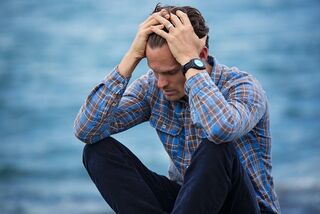Anxiety
How Anxiety and Fatigue Can Have Us ‘Walking in Circles’
Examining the relationship between anxiety and fatigue.
Posted December 6, 2022 Reviewed by Ekua Hagan
Key points
- Anxiety can be exhausting, which can then impact willpower, control, and decision-making capabilities.
- Anxiety is associated with insomnia, and sleep deprivation only intensifies the fatigue bred by anxiety.
- A healthy lifestyle—Mediterranean or equivalent diet, regular exercise, and sufficient sleep—can help with anxiety and fatigue.

Being anxious makes you tired, and being tired makes you anxious (and sleep more poorly). In my work as a sleep doctor and a psychiatrist, I am amazed to see how much anxiety can wear people down and leave them feeling exhausted. Indeed, a day of tough decisions, and pushing through piles of work and meetings, requires lots of energy, and leaves you with nothing by the time you get home. Fortunately, for most, weekends are a different story than a day at the office—though it can take a few days to recover from the energy deficit.
The fact is, mental activity and resisting impulses take tremendous mental energy. People with anxiety tend to feel more than others, and we have previously described anxiety as a “care problem.” Indeed, some people care a lot and think too much. This is a good thing until you are dealing with numerous stressful inputs. Because the people who care too much also feel too much—good, bad, positive, happy, etc.—and that emotional ride each day is tiring. It’s like driving through speed bumps without shock absorbers.
Making choices and resisting impulses (like to get up and leave the meeting or stop working on this project now in the fourth hour) requires energy. Poor sleep, low mood, and high anxiety can all make impulses and decision-making a lot harder, so it becomes a vicious cycle. People who feel too much care too much, and the decisions are even harder to make. This makes you tired. And then the decisions and impulse control become even harder. Repeat.
"We walk in circles, so limited by our own anxieties that we can no longer distinguish between true and false."—Ingmar Bergman
Researchers call that inability to distinguish “decision fatigue” or “ego depletion,” the struggle to think clearly, weigh options, make best judgments, and control behavior. As Bergman poetically notes, decision fatigue is an antecedent of anxiety disorders, considered the most prevalent type of mental illness in the United States.
“Evidence suggests that individuals experiencing decision fatigue demonstrate an impaired ability to make trade-offs, prefer a passive role in the decision-making process, and often make choices that seem impulsive or irrational,” write authors of a study published in a 2020 edition of the Journal of Health Psychology. Psychologist Daniel Kahneman describes ego depletion as a loss of inhibition, running out of the willpower to say “no,” and difficulties in distinguishing between right and wrong. People with anxiety simply feel too strongly and overreact; they are challenged to function normally, he indicates.
Other experts concur. They write in the journal Neuropsychologia that inhibition “can facilitate performance” and is “crucial to human social life.” But inhibition weakens when fatigue allows desires to become stronger, depleting willpower, these scientists state.
The National Institute of Mental Health indicates anxiety disorder affects as much as one-third of this country’s population at some time in their lives. More than 60 percent of respondents to a 2020 survey reportedly admitted to feeling “anxious” on occasion. Anxiety is marked by excessive worry, fear, and avoidance of stressful situations, including social gatherings. It can overwhelm the mind’s normal processing capabilities, creating unmitigated angst, worry, and even phobia-like fears, and quickly exhausting mental energy supplies. Lack of energy—fatigue—then reduces willpower, control, and decision-making capabilities.
Anxiety and Fatigue Are Closely Related
Recent research suggests an inextricable link between anxiety and fatigue. In a 2018 paper appearing in The British Journal of Psychiatry, scientists report, “Up to three-quarters of patients with fatigue syndromes have comorbid mood or anxiety disorders, suggesting that chronic fatigue is a forme fruste of anxiety or depressive states.”
Making matters worse is anxiety’s association with insomnia and other sleep disorders. Sleep deprivation only intensifies the fatigue bred by anxiety, further hindering normal daytime functioning and potentially leading to physical health problems and other cognitive issues, including loss of impulse control.
Walking in Circles
A study published in The Journal of Neuroscience finds that sleep loss amplifies “aversive brain anticipation.” Authors write, “Anticipation is an adaptive process, mobilizing preparatory responses to impending threat or danger. However, in excess, anticipation can be maladaptive, contributing to rumination, worry, and the debilitating social dysfunction associated with anxiety disorders.” In other words, anxiety and fatigue are bi-directional. Anxiety drives sleep problems, the resulting sleep deprivation enhances already anxious feelings of anticipated threat and doom, and the mind’s hyper-alertness produces mental fatigue. Mental fatigue, in turn, underlies decisional failures and the ego depletion that takes the brakes off impulsive actions and desires.
Do the Circles Have an Exit?
Yes, the circles do have an exit point, and one way of finding it is through a healthy lifestyle: Mediterranean or equivalent diet, regular exercise, and, of course, sufficient sleep. A sound night’s sleep is dependent on a person’s willingness to:
- Turn off technology at least an hour before bedtime. (Even put the mobile phone in another room.)
- Stick to a regular sleep schedule.
- Hide the bedroom clock so that the time is not being constantly checked while trying to fall asleep.
- Keep the bedroom cool, and the television out of it.
- Refrain from alcohol and caffeine at least several hours prior to sleep.
Other tips for controlling thoughts and reducing anxiety:
- Practice mindful meditation; live in the present. The past is past; you can do nothing more than learn from it. And the future? Well, it has not happened yet. In the words of well-known writer Alan Watts, no amount of anxiety makes any difference to anything that is going to happen.
- Do a thought-reality assessment. How likely is it that the scenario or scenarios you seem to fear are going to happen?
- Take mental breaks. Read a good mystery novel or simply let your mind wander about matters that are pleasant or of little note.
- Journal. If your worries are keeping you awake for more than 10 minutes, get up; jot them down; consider whether any of them are a true problem; if any are, spend a couple of minutes thinking about how you might approach or resolve them; and then return to bed, knowing you have it all under control.
Should anxiety affect your quality of life, contact a psychiatrist or therapist for an evaluation. Finally, consider the words of surgeon Maxwell Maltz, author of the book Psycho-Cybernetics: A New Way to Get More Living Out of Life: “Times will change for the better when you change."
To find a therapist, please visit the Psychology Today Therapy Directory.




